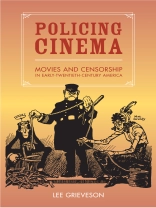White slave films, dramas documenting sex scandals, filmed prize fights featuring the controversial African-American boxer Jack Johnson, D.W. Griffith’s The Birth of a Nation—all became objects of public concern after 1906, when the proliferation of nickelodeons brought moving pictures to a broad mass public. Lee Grieveson draws on extensive original research to examine the controversies over these films and over cinema more generally. He situates these contestations in the context of regulatory concerns about populations and governance in an early-twentieth-century America grappling with the powerful forces of modernity, in particular, immigration, class formation and conflict, and changing gender roles.
Tracing the discourses and practices of cultural and political elites and the responses of the nascent film industry, Grieveson reveals how these interactions had profound effects on the shaping of film content, form, and, more fundamentally, the proposed social function of cinema: how cinema should function in society, the uses to which it might be put, and thus what it could or would be. Policing Cinema develops new perspectives for the understanding of censorship and regulation and the complex relations between governance and culture. In this work, Grieveson offers a compelling analysis of the forces that shaped American cinema and its role in society.
สารบัญ
List of Illustrations
Acknowledgments
Introduction
1. Policing Cinema
2. Scandalous Cinema, 1906–1907
3. Reforming Cinema, 1907–1909
4. Film Fights, 1910–1912
5. Judging Cinema, 1913–1914
Conclusion
Notes
Bibliography
Acknowledgments of Permissions
Index
เกี่ยวกับผู้แต่ง
Lee Grieveson is a Lecturer in the Film Studies Program in the School of Humanities, King’s College, University of London, and a recipient of the prestigious Katherine Singer Kovacs Essay Award from the Society for Cinema and Media Studies.












